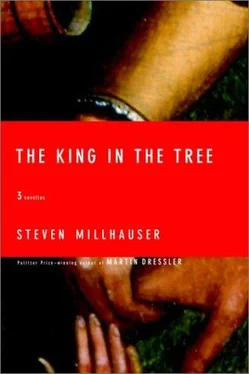He stayed in bed for the rest of the day, and the next morning he was examined by Dr. Centlivre, a plump man with a very small nose, large melancholy eyes, and streaks of wig powder on the shoulders of his frock, who kept reaching into a pocket in the waistband of his breeches and removing a silver-cased watch that he held up to his ear. Dr. Centlivre announced that the patient was suffering from a fever, gave him a teaspoonful of foul-tasting green liquid that Juan spat onto the floor, let out a cupful of his blood into a basin, and recommended a regimen of rest supplemented by boiled duck and small beer. Then he examined his watch once more, returned it to his fob pocket, and proceeded to tell a long story about a fox that had killed two of his bantams. Juan, weakened by the bloodletting, was led by his servant to the sofa in his sitting room before an open window. There Mary read to him, while his mind wandered down to the river.
A weariness coursed through Don Juan. So that was it! He was not well — he who had never been ill a day in his life — and his sensation of dullness and melancholy was the sign of his illness. The news cheered him a little, for it meant that the trouble lay not in Swan Park but in his debilitating fever. It was true that the doctor had struck him as a fool, with his insufferable watch and his dead bantams. Juan had heard it said that when a physician knew nothing he always said “fever,” a vague word covering a multitude of symptoms, including those of health. In fact, far from feeling warm, he felt like a lump of damp earth; and anyway, he would sooner stick his sword into the doltish doctor’s plump belly than permit him to steal any more of his blood. Still, something was wrong with him. The word “fever” was in one sense soothing — it removed the necessity for further thought. For he was tired, there could be no doubt about that; and a languor had come over him. It was as if the act of lifting his arm were more than he could bear. Sometimes, looking up, he would see Mary staring at him anxiously with her hazel eyes. Then an irritation would seize him, for his languor was not unpleasant; and he wished he were alone, so that he might sink into himself, and drift away into a heavy-lidded half-waking drowsiness.
One afternoon Mary entered his sitting room with four or five books that she had brought up from the library. She sat down in the armchair facing his sofa, opened a book, and removed a letter. “Georgiana has written to say that she is coming back to us on Thursday. Father is such a dear. He says he can’t keep her there for his own selfish pleasure. He feels there is really nothing for her to do in Belford, which of course is entirely untrue. She says—” Juan felt an odd rippling in his stomach. Blood beat in his temples, he had the sensation that somewhere many windows had been flung open — and he felt a surge of dark excitement, a tide of dangerous joy, so that he placed a hand on his chest as if to keep himself from bursting. And because, even now, Don Juan did not know what was happening to him, as he lay on his sofa trying to calm the rush of his blood, he said to himself, with a touch of sulkiness, “What the devil’s wrong with me? That doctor is a blockhead. I’m not well, not well at all.”
“What I most like about this place,” Georgiana was saying, as she stopped for a moment on the path by the Ymber to lift both hands in a gesture of welcome, “is that nothing ever changes.”
“Why, I cannot agree with you entirely,” Augustus Hood said. “For say you overlook my little improvements — the new laburnum planting beside the hermitage, which you really must make it a point to see tomorrow, the felling of pines in the grove by the northwest cascade — yet one notices small changes in Nature every day — every hour. The rye has grown measurably taller. The sun sets a little earlier, at a point farther south. The hawthorn hedge—”
“But — good heavens! — you take my meaning too literally, Augustus. Let the corn grow as high as the house, let the sun be extinguished by a sneeze. I was speaking of all that underlies such changes. Do you not feel, that underneath Nature, and all that decays, there is another Nature, supporting and upholding all? That is what I meant, when I said—”
“You, at least, my dear Georgiana, never change,” Hood remarked.
The four were walking after dinner along the path of osiers, and Juan felt the calm, reassuring return of the familiar rhythm of days, under the always blue sky, in the green world of his deepest desire. But even as he took in the familiar details — the osier branches trailing in the dark water, the swan and its cygnets gliding over their clear reflections, the meadows across the river glowing in the yellow light of evening — he knew that everything had changed. Georgiana herself was so different from what she had been that he wondered whether he had ever looked at her before. The other Georgiana had been composed of three or four hasty strokes — a hat, a ribbon, a cool smile— like a woman glimpsed in a passing diligence, whereas this Georgiana was a torrent of details, which were almost impossible to seize because of a disturbing radiance that made it difficult for him to look at her. Her mouth, for example — how had he failed to notice, in the old days, the way her top lip would press tightly against her teeth when she smiled, while her nostrils, faintly reddish at the sides, seemed to quiver with energy?
He had begun to rise earlier, filled with impatience to see Georgiana, as if to assure himself that she hadn’t disappeared again into Sussex or Flussex or wherever it was she had gone to. At the same time he experienced a wariness, almost a reluctance, for not to see her was at least to remain in a known condition, however undesirable, whereas to see her always unsettled him and made him feel unfamiliar to himself. At breakfast he would catch himself gazing at her naked hands, or at a thin strand of hair lying on her cheek, and he would turn violently away — or he would notice himself staring stupidly at his plate, while around him he became aware of an alarming silence. During the morning walk he was eager to have Georgiana’s attention, while at the same time he wished himself invisible, so that he might observe her in peace. If he rode off with Hood he was relieved to be away from the house, with its awkwardness and strangeness, yet he was fiercely impatient to return, since he suddenly could no longer remember what she looked like, exactly. At dinner he followed her conversation closely. He liked to watch her mouth and eyes, and the way the tip of her nose, tugged by her upper lip, would move very slightly when she spoke. In the evening, if he walked beside her, he had the sense of an imperfect, blurred view, or of sharply glimpsed pieces of face and lace and flounces flashing out at him before dropping away into nothingness. Then he longed to walk behind her, where he would be able to watch, slowly and thoughtfully, the complicated movements of her gown, the late light on her hair, the green shade and pale sunlight rippling across her hat and shoulders. But when he actually did find himself walking behind her, he felt cut off, cast out, abandoned, like an outsider among a group of close friends who have agreed to endure him patiently while secretly wishing he would go away. At night he lay restlessly awake for a long time before plunging into deep, dreamless sleep, from which he suddenly woke feeling heavy-headed and weary, with throbbing temples, as if sleep had been an exhausting labor.
He seized every chance of being alone with Mary, in order to discuss Georgiana. Falling behind with Mary on the path by the river, he would say, “I think your sister is looking a little pale today. Don’t you think she is looking a little pale?” or “I admire that black silk bracelet, the color suits her perfectly.” When he accompanied Hood on his rounds, he would pursue a conversation of the night before, in order to feel, in the air around him, the presence of Georgiana. Once, when he complimented a pleached bower by saying that it was difficult to tell where Nature left off and Art began, Hood said, “Georgiana believes that”—and at the sound of her name, which startled him as if Hood had suddenly drawn aside a curtain, revealing Georgiana in her traveling cloak hurrying toward him, Juan banished all expression from his face, as his breath came short and blood beat in the veins of his neck.
Читать дальше












